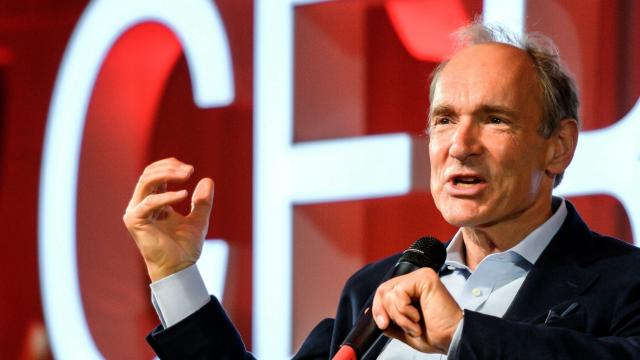A sceptic might read the headline “I Invented the World Wide Web. Here’s How We Can Fix It” as another hollow New York Times regret-itorial along the lines of “I Created a Monster. Here’s My Next Thing!” But Tim Berners-Lee, the benevolent father of the internet, has produced an international treaty to rebuild the web as its founders envisioned, with the endorsements of Facebook and Google, as well as the French, German, and Ghanaian governments. It’s extremely optimistic in that it envisions the possibility of peaceful co-existence with Facebook and Google, but yes, let’s lay down some laws for them to break.
The Contract for the Web flows from Berners-Lee’s proposal at last year’s Web Summit, crafted with input from over 80 organisations and surveyed citizens, and spearheaded by representatives from entities, including Facebook, Microsoft, and the French, German, and London governments. It outlines nine principles for government and company-implemented reform on tenets like privacy, transparency, inclusivity, and rational dialogue. Since it officially unrolled yesterday with a little over 160 backers, hundreds of other organisations are signing on–at this writing, the World Wide Web Foundation reports are 500 endorsing organisations, including Twitter.
The contract is less of a law than an agreement on fundamental moral principles for society: don’t verbally abuse people, don’t hit the kill switch, don’t spy on people, tell us you’re spying if you are, tell us how much you need to spy, and don’t censor free speech. The only enforcement mechanism is being removed as a backer if the steering committee finds that governments and companies aren’t adhering to it. It seems sort of like the Paris Accord with pledges for action that are more difficult to measure and we still need to identify benchmarks for what peak levels of abuse we’re willing to put up with.
It calls on governments to establish comprehensive data laws, including things like the right to data portability (so that you can, for example, move your data from Facebook to another service). They would also have to publish data registries to show how they’re sharing their citizens’ information, to not restrict internet access, and regulate for more business competition. (In a perfect world, China would have to tear down the firewall, and the U.S. would overthrow the duopoly–though of course, neither countries have signed on.) It also calls for ending internet shutdowns, which have been ramping up alongside protest movements; India reportedly shut down the internet over 100 times last year alone, and just last week, Iran cut access during nationwide demonstrations. In the New York Times editorial, Berners-Lee writes that the contract “is already being used to inform policy decisions.”
He also goes so far as to call on governments to ban political targeted advertising (a hard yes from Gizmodo), although the contract doesn’t state that explicitly.
As for companies, the rules are blurry: they would have to adopt net neutrality “guidelines,” “minimise data collection to what is adequate, relevant, and necessary,” offer more easily-accessible privacy controls, and publish transparency reports and human rights assessments. But a pact to create “innovative business models that strengthen data rights, respect privacy, and minimise data collection practices” seems like a pipe dream for backers like Facebook and Google, given the fact that their business models so heavily rely on perpetuating so many of the problems that this pledge seeks to address. (The more optimistic outlook is that those tech giants are best positioned to do something that has an impact.) The contract would ideally help regulators figure out exactly what that “adequate, relevant, and necessary” levels of data collection means.
Then there’s: “Assessing and addressing risks created by their technologies, including risks associated with online content (such as misinformation and disinformation), behaviour, and personal well-being.” Twitter has been making mealy-mouthed promises to do this (see Jack Dorsey’s totally indecipherable interviews) but doesn’t seem to have an answer to that problem that wouldn’t involve nuking the site.
Inclusivity is another big piece, asking platforms to offer content in various languages and accessible media. Plus it takes into consideration how women and marginalised groups are affected by a male-dominated web. For example, Berners-Lee points to a case in which app developers didn’t think about how sharing jogging routes can expose women to stalkers and street harassers. As one remedy, he urges companies to self-impose more workplace diversity requirements.
You can sign on, too, and make citizen pledges to share open licenses, resist the hate, and also please don’t publish revenge porn.
Unfortunately, the eager participation of Facebook, the main culprit here, is an obvious charade. In answer to last week’s Amnesty International report calling Facebook’s surveillance a human rights threat, Facebook replied that “no one is obliged to sign up for Facebook”–in other words: tough shit. Berners-Lee himself reiterated in a BBC interview published today that Facebook needs to step up, calling on Mark Zuckerberg to join Twitter (and Google, partially) in banning political ads. “It’s not fair to risk democracy by allowing all these very subtle manipulations with targeted ads which promote completely false ideas,” he said. Yes, true, murder Facebook.
